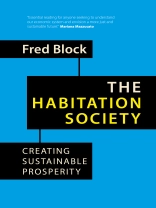In The Habitation Society, leading economic and political sociologist Fred Block argues that we are at a time of “blocked transition” from one mode of economic and social organization to another. We now have a habitation economy because most people work at creating, maintaining or improving the soft and hard infrastructure of the communities in which we live. The problem, however, is that we do not yet have a habitation society since our economy continues to be organized through the structures, institutions and concepts of an industrial economy. While the old industrial economy is dying, the new habitation society cannot yet be born.
But it is more than this, our methods for understanding how the economy works are also built around the analysis of industrial production, which are completely inadequate, Block shows, for grasping the new reality of how we buy and consume services in the habitation economy. In the absence of concepts to make sense of what is happening, the political space becomes filled with conspiracy theories and disinformation. Specifically, it has become extremely difficult for people to understand their own relationship to the larger economy and society, in particular, there is no longer an obvious relationship between the amount or intensity of work effort and economic output.
Fred Block’s compelling analysis offers a path through this confusion and a means to understand our transition and what form this will take. He examines the economy as it actually exists in the present and maps out what would make that economy work more effectively in the hope that this will empower individuals to recognize the kinds of changes that could be made to improve things for themselves, their families and their communities.
Tabla de materias
1. Accounting for morbid symptoms
2. Why habitation?
3. Commodification without the commodities
4. The irony of corporate dominance
5. What counts as investment?
6. Dysfunctional financing
7. Democratizing habitation
Sobre el autor
Fred Block is Research Professor of Sociology at University of California Davis. He is widely regarded as one of the world’s leading economic and political sociologists. He has served on the Board of the Karl Polanyi Institute of Political Economy since 1989 and is the author, most recently, of Capitalism: The Future of an Illusion (2018).












